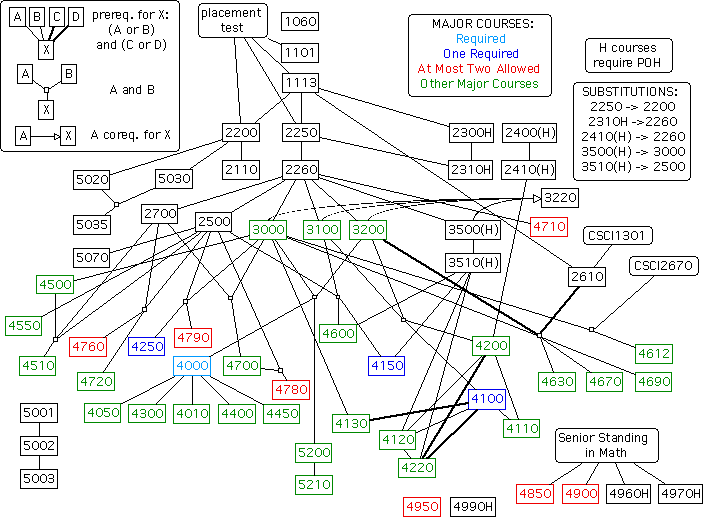I know that college mathematics typically start at Calculus I (Differential Calculus) and then Calculus II (Integral Calculus). Then after Calc II, it starts to branch off a little. One option after the first two semesters of Calculus is Calculus III (Vector/Multivariable Calculus). Another option is Linear Algebra, and then the next course is Differential Equations. I know that other, more advanced math topics exist like Number Theory/Abstract Algebra, Discrete Mathematics, Partial Differential Equations, Geometry Topics and Topology. I was wondering what order the above mentioned math topics go in and what their prerequisites typically are. If anyone can provide me with a flow chart, then that would be great.
-
9Mathematics is done differently at different colleges. Further, the emphasis is different when you are learning applications (engineering and applied math) or learning theory (computer science and pure mathematics). For prerequisites, consult the course catalog, the department, and individual instructors as needed.– Not Quite An OutsiderCommented Jul 3, 2014 at 23:29
-
4You might want to consider asking over on matheducators.SE as well.– Chris CCommented Jul 3, 2014 at 23:48
-
2Before you step into the abyss of higher mathematics, take a course that teaches you how to read, understand, and construct mathematical proofs.– PaulCommented Jul 4, 2014 at 0:53
-
2@ChrisC StackExchange does not allow cross-posting. The OP may ask for this to be migrated to math educators, or delete this question here and then post it there, but should not post it there "as well"– ff524Commented Jul 4, 2014 at 5:28
-
3There is no one system in any country, let alone across the whole world. Do you have a particular country in mind, even?– David RicherbyCommented Jul 4, 2014 at 9:24
2 Answers
This depends heavily on the student and his/her interests. You will need almost all of these courses, but it's a bit murky after linear algebra, multivariable calculus, and differential equations. Did you learn proofs in any of those courses? If not, then maybe a proofs course. This all depends on the department that you're in and how they arrange how they teach mathematical maturity and theory.
Since you asked for a flow chart, I can give you an example of one department's flow chart for their courses.
What the numbers all mean can be found here.
Hopefully this gives an example of what one department's flow chart looks like. You can clearly see there's a lot of choices to take and a huge 'choose-your-own-adventure' part to it.
Heavily depends on the university. For Germany, Calculus is already covered in high school.
However, since you are probably not going to study in Germany, your mileage might vary. I would suggest looking for specific programs at universities you are interested in - there you will be able to see the exact courses offered (as well as the different concentration, e.g. pure mathematics).
On there, you can find road maps for the general undergraduate degree in Mathematics (for many different concentrations). Hope this helps!

